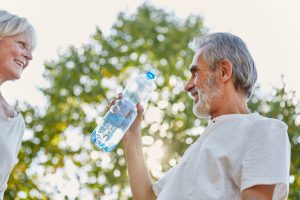
We’ve braved months of cold winds, icy roads, and even a spring snowstorm or two, but summer is finally just around the corner. As you start trading your sweaters for short sleeves, take a few minutes to brush up on some of the risks that come with warmer weather—and how to stay safe and healthy this summer.
Heat-Related Summer Health Risks for Seniors
We sometimes get as hot in the summer as it gets cold in the winter, and that means heat-related health issues can be a real danger—especially for seniors. While extreme heat can be dangerous at any age, your risk for heat-related illness increases as you get older. Dehydration and hyperthermia are the top health risks seniors face in the summertime.
Dehydration – Feelings of thirst tend to decrease as we age, which means seniors are more likely to become dehydrated. Some medications may also make you more susceptible to dehydration by acting as a diuretic or making you sweat less. Talk with your doctor about side effects of your daily medications that may put you at risk.
Watch out for signs of dehydration:
- Dizziness
- Dry mouth
- Headaches
- Low blood pressure
- Constipation
- Low urine output
- Confusion
- Rapid heart rate
Hyperthermia – Heat exhaustion and heat stroke are both forms of hyperthermia, a condition in which the body’s internal temperature is dangerously elevated. Our body’s natural heat regulating mechanisms don’t work as well when we get older, which increases the risk for hyperthermia.
Symptoms to watch for:
- Excessive sweating or lack of sweating
- Dizziness
- Nausea
- Muscle cramps
- Weakness
- Rapid pulse
- Headache
- Rapid and shallow breathing
Heat exhaustion can develop quickly, and if not treated can turn into life-threatening heat stroke. If you or someone else is experiencing symptoms, get to a cool place, start hydrating, and contact your nursing staff immediately.
Tips for Staying Safe in the Sun
Just because sun exposure comes with some risks doesn’t mean you should spend your summer indoors. Exposure to sunlight is critical to mental and physical wellbeing. Follow these tips to get your daily dose of sunshine the safe way:
- Stay Hydrated – Drink more water than you think you need. If you feel thirsty, that’s a sign you’re already becoming dehydrated.
- Take a Siesta – The sun is at its peak during midday. Head inside for a rest during these hours to avoid the most intense rays.
- Crank the A/C – Extreme heat can follow you indoors if you don’t set your air conditioner accordingly. Set your A/C at a comfortable 72-75 degrees F and use fans to distribute the cool air.
- Dress Cool – Choose light-colored clothing in breathable fabrics such as cotton or linen to help regulate body temperature. Throw on a hat before you go outside.
- Avoid Strenuous Activity – Your body has to work much harder to regulate its temperature when it’s hot outside, which means hyperthermia can come on quickly. Consider trying one of these low-impact summer activities.
Summer is a great opportunity to spend time outside with grandkids, replenish your vitamin D, and enjoy the beauty of Mother Nature. We hope you keep these safety tips in mind while you get the most out of this sunny season.